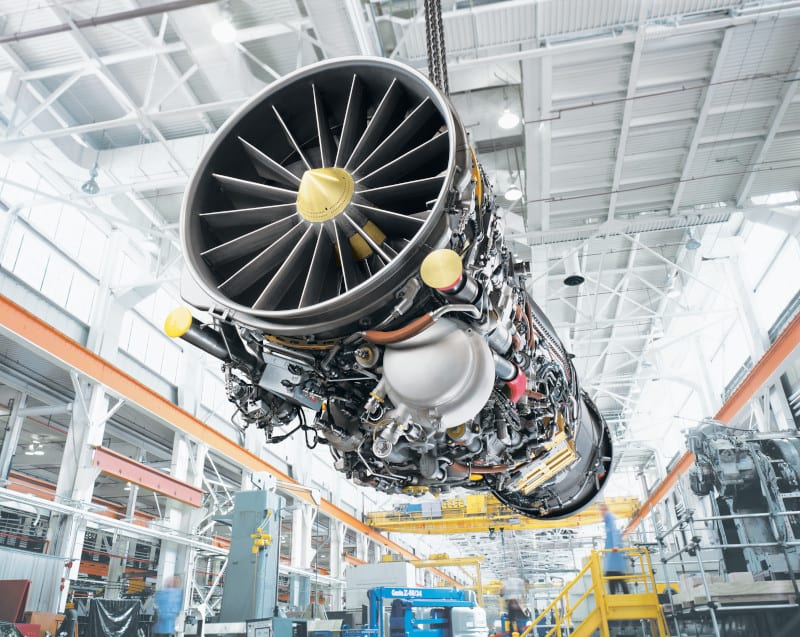LYNN — GE Aviation has been awarded more than $476 million in military contracts over the past month to produce engines and hardware to support the U.S. Armed Forces and international customers.
The majority of the work from those contracts will be performed at the River Works plant in Lynn, with the rest taking place across the company’s U.S. supply chain, according to information provided by GE Aviation.
GE Aviation said it powers more than two-thirds of U.S. military fighters and helicopters, but customers continue to face aircraft issues related to age, maintenance, supply and support.
Increased engine and component production will expand the military’s aircraft availability, the company said, noting that hundreds of military aircraft are in the air daily to assist in critical areas needed to combat the coronavirus pandemic.
“These new contracts underscore the essential role we play as the leading provider of fighter and helicopter engines for our military customers,” said Al Dilibero, GE Aviation’s general manager of Medium Combat & Trainer Engines, in a statement.
“We are honored by these opportunities, which will add to GE’s current installed base of more than 27,000 military engines, most of which were built right here in Lynn.”
The awarded contracts include:
- A $62 million contract modification to manufacture T700 engines for 40 UH-60M Black Hawk Helicopters for the U.S. Army and international customers.
- A $215 million contract modification to produce 48 F414 engines and modules.
- A $138.2 million contract to provide TF-34 engine supplies to the U.S. Air Force.
- A $51.5 million contract modification for eight F414 spare engines, 11 afterburner modules and 12 low pressure turbine modules for the Navy F/A-18.
- A $9.7 million contract modification to restart T-64 engine core production in support of the H-53E Engine Reliability Improvement Program for the Navy.
The U.S. Military’s coronavirus response has included building and converting facilities into temporary care centers, distributing food, providing security, and transporting medical supplies.
GE Aviation cites daily response efforts carried out by military aircraft that it has powered in particular, such as GE T700-powered Black Hawk helicopters delivering critical supplies to communities and CF6-powered C5M Super Galaxy aircraft being used to mobilize medical personnel.
Statistics from the U.S. Department of Defense show that more than 28,000 National Guard soldiers and airmen throughout the country have been activated to support the military’s COVID-19 response.
“The efforts of our dedicated military servicemen, servicewomen, and civilians that are responding to the COVID-19 outbreak is heroic,” said Dilibero in a statement. “We are focused on doing our part to support the Warfighter.”
The positive news for GE Aviation Lynn comes during a time when IUE-CWA Local 201, a labor union representing more than 1,200 workers at the city’s River Works plant, has repeatedly cited health and safety concerns at the factory.
In past weeks, following several positive COVID-19 cases at the plant, the union has called for a two-week shutdown of the factory, increased sick pay and has lobbied for the company to begin producing ventilators in Lynn.
Union leadership said in a past interview the company has denied those requests, and in its latest notice, which was posted on its Facebook page, the union said GE was following the lead of the Centers for Disease Control and Prevention by “placing profits before people.”
GE spokesman Richard Gorham maintains the company has “acted early and aggressively” during the COVID-19 pandemic “to ensure employee health and safety at GE Lynn, going over and above CDC guidelines and drawing on best practices from our global experience,”
He said those actions have included daily meetings with the company’s cleaning contractor and site leadership on cleaning protocols, which have been ongoing for the past two months. Those protocols are evaluated daily, Gorham said, based on guidance from national and local health authorities.
“Throughout this unprecedented time, employee safety has been our top priority,” said Gorham in a statement. “We stand behind the measures we have taken to address this health challenge by protecting our employees while continuing to meet our obligations to the U.S. military. We continue to meet with the union and invite them to join us on regular plant safety walks as part of our process to keep improving.”

